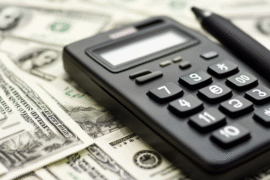This article may contain references to products or services from one or more of our advertisers or partners. We may receive compensation when you click on links to those products or services. Nonetheless, our opinions are our own.

Updated by Albert Fang
Did you recently file for bankruptcy and had some of your debts discharged?
Bankruptcy can be a legal option for debt relief, but will the creditor likely allow you to get a personal loan.
Can I Get a Loan After Bankruptcy?
Yes, you can often get a loan after filing bankruptcy. That said, the type of loan may be affected which we will discuss later.
Filing for bankruptcy doesn’t have to be the end of the world. There are many reasons why people file for bankruptcy. It can be medical expenses, losing a source of income, or going through a divorce. Whatever your reason for filing bankruptcy was, bankruptcy offers you a fresh start to get on your feet. Chapter 7 bankruptcy also includes credit counseling and debtors’ education classes to ensure you get back on your feet. Sometimes, getting a loan after filing bankruptcy can be the beginning of a fresh start.
Why Do People Refrain From Getting Loans After Bankruptcy?
It is easy to assume that after filing Chapter 7 or 13 bankruptcy and successfully getting a discharge, the debtor will never want to sink into debt again. Nonetheless, often, we need money to finance projects, and taking out a loan is the only reality. Bankruptcy is usually the last resort for many. So, if you previously filed for bankruptcy, you may be scared that taking another loan might sink you into debt. But if you ever need financial help in the future, you can always apply for a loan.
Am I Eligible for a Loan While Filing for Bankruptcy?
Depending on whether you are filing Chapter 7 or 13 bankruptcy, you may or may not be eligible for a loan. Here is a breakdown of your eligibility based on each type of bankruptcy.
Chapter 7 Bankruptcy
It is hard to qualify for a loan while filing a Chapter 7 bankruptcy case. New loans will not be discharged and are considered fraudulent since you are aware of your inability to repay them. So, even if you qualify for a loan, it will not get discharged alongside other unsecured loans. Therefore, you will remain legally obliged to repay the loan even after receiving a bankruptcy discharge. However, if you desperately need a loan, you don’t need to wait long since most Chapter 7 bankruptcy cases are closed between four and six months. Once your case is closed, you can apply for loans and qualify.
Chapter 13 Bankruptcy
In most cases, you can qualify for a loan if you are filing for Chapter 13 bankruptcy. Most Chapter 13 repayment plans take between 3 and 5 years to complete. The court recognizes that a debtor might need financial assistance during this repayment duration, thus, making it possible to get a loan.
However, you will need to petition the court in your pursuit to incur new debt, and get an approval before the lender loans you any money. When reviewing your petition, the court will consider your reason for the loan, how repaying the loan will affect your Chapter 13 repayment plan and other essential factors.
Although you can incur debt when filing for bankruptcy, you should have a good reason for the debt. If you are filing Chapter 13, you also need to prove you can continue with your repayment plan despite incurring additional debt.
You may wonder why people file a Chapter 13 bankruptcy when it’s often more expensive and lasts longer? One reason may be that the individual wants to keep their house. Another reason may be that the individual did not qualify for Chapter 7 bankruptcy.
Loans You May Be Able Apply for After Bankruptcy
After receiving a bankruptcy discharge, you begin your financial life fresh. Bankruptcy can negatively impact your credit score, making it hard to get a loan right after bankruptcy. That said, there are specific things you can do to rebuild your credit after bankruptcy, which can help show creditors that you are creditworthy for a loan.
There are some underwriting rules which apply to government-backed mortgages. These rules define how long you should wait to qualify for a mortgage loan after filing bankruptcy. The waiting period will depend on the Chapter of bankruptcy you filed and the type of conventional mortgage you are applying for. In some cases, you might wait for as little as two years. However, if you wish to apply for a non-conventional mortgage, you might get it sooner.
If you want to get a consumer loan, it will be much easier. Most lenders are open to lending debtors when their bankruptcy cases close. The best loan will depend on your financial situation. But here are some options to consider;
Secured Credit Cards
After bankruptcy, you need to work on rebuilding your credit score. One way to get financial help and rebuild your credit score is by applying for secured credit cards. Secured credit cards require you to deposit a specific amount with the compare as security for your charges. However, it offers you a chance to rebuild your credit and access a credit card after filing for bankruptcy.
Secured Loans
if you retain your property after bankruptcy, you can get secured loans to qualify for low-interest secured loans. But, remember, you risk losing the property if you default on the loan.
Online Lenders
Most online lenders specialize in offering their services to people who just got out of bankruptcy. However, you should read the fine print carefully to understand these loans’ interest rates, terms, and conditions. While their offers may be tempting, only borrow the amount you need and can repay within the specified time frame.
Credit Union Loans
If you are a credit union member, you can quickly request and qualify for a loan through the union.
Co-signed loans
It is a wise idea to get a co-signed loan with a close friend or family member since you might qualify for a loan with lower interest. However, you need to be sure you can repay it since your cosigner will be considered legally responsible for the loan if you default.
What You Need to Know Before You Apply for a Loan as a Discharged Bankrupt
You may get a loan after filing either Chapter of bankruptcy. Although there are rules on how long you need to wait before qualifying for mortgage loans, you can easily be eligible for a consumer loan.
Nonetheless, you need to be very cautious before taking a loan. Just because you qualify doesn’t mean you should take a loan. Remember, you might not be eligible for tile bankruptcy back-to-back, and you may not be eligible for a bankruptcy discharge until after several years.
For example, if you had filed a Chapter 7 bankruptcy and received a debt discharge, you will need to wait eight years to be eligible for another discharge. On the other hand, if you had previously filed a Chapter 13, you will wait for two years before being eligible to receive a discharge under Chapter 13 bankruptcy. So, you need to be cautious about taking loans since if you accidentally sink into debt and future debt collection, you might need to wait a couple of years before qualifying for a bankruptcy discharge.
Be Cautious With Your Personal Finances
Depending on your reason for wanting a loan, getting it could be necessary. However, you need to be cautious with your personal finances. To ensure you don’t sink into debt again, adopt healthy financial practices like budgeting and reducing monthly expenses.

Reviewed and edited by Albert Fang.
See a typo or want to suggest an edit/revision to the content? Use the contact us form to provide feedback.
At FangWallet, we value editorial integrity and open collaboration in curating quality content for readers to enjoy. Much appreciated for the assist.
Did you like our article and find it insightful? We encourage sharing the article link with family and friends to benefit as well - better yet, sharing on social media. Thank you for the support! 🍉
Article Title: Is it Possible to Get a Personal Loan after Bankruptcy? 5 Things to Know
https://fangwallet.com/2022/06/25/is-it-possible-to-get-a-personal-loan-after-bankruptcy-5-things-to-know/The FangWallet Promise
FangWallet is an editorially independent resource - founded on breaking down challenging financial concepts for anyone to understand since 2014. While we adhere to editorial integrity, note that this post may contain references to products from our partners.
The FangWallet promise is always to have your best interest in mind and be transparent and honest about the financial picture.
Become an Insider

Subscribe to get a free daily budget planner printable to help get your money on track!
Make passive money the right way. No spam.
Editorial Disclaimer: The editorial content on this page is not provided by any of the companies mentioned. The opinions expressed here are the author's alone.
The content of this website is for informational purposes only and does not represent investment advice, or an offer or solicitation to buy or sell any security, investment, or product. Investors are encouraged to do their own due diligence, and, if necessary, consult professional advising before making any investment decisions. Investing involves a high degree of risk, and financial losses may occur including the potential loss of principal.
Source Citation References:
+ Inspo












































